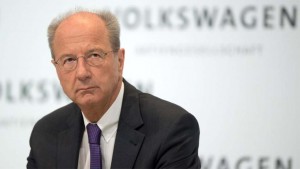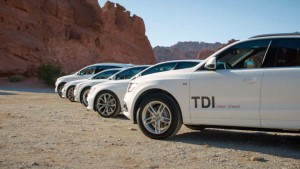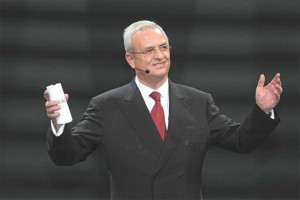The trans-Atlantic criminal probe into Volkswagen’s diesel rigging has now targeted the German automaker’s top executive, Chairman Hans Dieter Poetsch, the company confirmed over the weekend.
He joins a number of other senior executives – including ousted CEO Martin Winterkorn – who are facing investigation in the U.S. and Germany for their possible roles in VW’s effort to cheat on diesel emissions tests. Prior to his appointment in September 2015, Poetsch served at VW’s chief financial officer.
The investigation of Poetsch and two other board members by prosecutors in the city of Braunschweig could complicate efforts by VW to move past the scandal. As TheDetroitBureau.com reported last week, the automaker is moving closer to a settlement covering the second of two diesel engines Volkswagen has admitted rigging. Meanwhile, hoping to offset the roughly $20 billion it has already committed to pay out due to the scandal, VW board members on Friday laid out extensive cost-cutting plans.
(Heavy lifter: much riding on new VW Atlas. Click Here for the story.)
The crisis was kicked off in September 2015, when the U.S. Environmental Protection Agency accused VW of using a so-called “defeat device” to rig emissions test on its 2.0-liter turbodiesels. The automaker subsequently acknowledged that scam – and then admitted it had also rigged a more upscale 3.0-liter diesel engine.
In June of this year, VW reached an agreement with various U.S. and California authorities calling for a $14.7 billion payout including about $10 billion to cover the buyback of vehicles equipped with the smaller diesel. That program has just gotten underway.
(Diesel buyback proving popular with VW diesel owners. Click Here for the latest.)
About 475,000 vehicles marketed in this country were covered by that settlement. Roughly 50,000 more VW, Audi and Porsche products using the bigger engine were sold in the U.S. A settlement could come within weeks, according to sources, and is expected to be significantly smaller in dollar terms. VW is expected to try to repair, rather than buy back many of those vehicles.
In June, during the announcement of the 2.0-liter engine settlement, a senior U.S. Justice Department official stressed that a separate criminal investigation would continue. An engineer who helped program the defeat device became the first to plead guilty to charges in September.
U.S. authorities are believed to be working closely with their counterparts in Germany where the VW investigation is largely being run out of the city of Braunschweig, near VW’s headquarters in Wolfsburg.
Even before the latest developments, prosecutors were already targeting both Winterkorn and Herbert Diess, now the Volkswagen brand boss. One concern was that they withheld information about the diesel rigging from shareholders after learning about possible irregularities as early as May 2014. Guidelines in Germany and the U.S. normally require the release of such information because of the material impact it could have on a company’s stock price.
VW has rejected allegations involving the executives, pointing to the result of its own internal audit.
“Based on careful examination by internal and external legal experts, the company reaffirms its belief that the Volkswagen Board of Management duly fulfilled its disclosure obligation under German capital markets law,” VW said in a statement.
Separately, VW is working on a variety of ways to cut costs, a strategy only partially based on the expenses related to the diesel scandal.
It is working on possible job cuts with its German union. And, in an interview with the German daily Boersen-Zeitung published over the weekend, VW brand chief Diess said the maker now hopes to extend the life of its MQB modular platform to reduce costs substantially. The MQB will eventually be used in dozens of models sold by the VW, Skoda, Seat and Audi brands.
“In the past months we have worked on the cost side of MQB and made significant progress,” Diess said, noting the goal is to double operating margins to 4% from the current 2%.
“We will achieve more in the future with fewer investments to respond to competition,” he added.
(For the latest on the VW diesel settlement, Click Here.)



